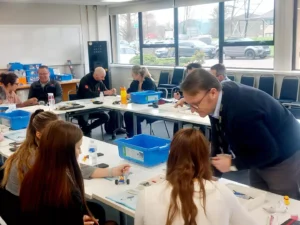There’s a warning STEM (Science, Technology, Engineering and Maths) career provision in schools and colleges across England needs significant improvement if more young people are to understand and be inspired by STEM careers.
The EngineeringUK report, ‘Advancing STEM careers provision in England’ highlights a need for structured work experience and adequate teacher support to ensure students are prepared for future careers in STEM. The findings identify challenges in funding, staff time, and access to quality work experience opportunities and the report calls on government to publish a new long-term careers strategy for England, with a work experience strategy to run alongside it.
EngineeringUK surveyed 188 teachers and others in schools about the barriers they face in delivering effective STEM careers guidance.
One survey respondent said: “We could do more if teachers had more time, and if it fitted with the curriculum. There’s a lot that falls between the gaps – e.g., Engineering – is it the responsibility of Maths, Science or DT? We used to have a STEM coordinator, which worked well, but the funding fell away.’
Another respondent pointed out, “There is not enough funding, qualified staff or time allocated to it, and yet so much is expected in terms of impact, results and reaching targets. It is often sidelined in schools or bolted on to another job, so not always given priority.
The report also highlighted:
- Only 61% of respondents said students of work experience age at their school take part in STEM work experience each year
- Over a third (36%) who highlighted funding as a barrier to delivering STEM careers provision told us the lack of funding means that they are unable to support STEM work experience in their school
- Insufficient funding prevents 37% of respondents from engaging more with STEM employers
- 33% cite a lack of capacity within schools to engaging more with STEM employers
- 43% said practical help in finding good quality STEM work experience for students could be improved
- 25% said Careers Leaders in their school are being allocated less than 1 day per week to fulfil their roles
Science Education Tracker, published by EngineeringUK and the Royal Society earlier in the year, found that just 15% of students had done STEM related work experience but a further 26% of students had wanted to do STEM-related work experience but had unable to do so.
Many STEM employers offer outreach STEM work, though it would be good to see many more offer placements. Neil Young, Group Engineering Capability Director, Babcock International Group, a Corporate Member of EngineeringUK, said, “We believe work experience and placements are all really important ways to offer young people a real life experience into the world of STEM careers.
“At Babcock we have multiple programmes that run across the business. One of those is in our Devonport site, called Future Engineers, where we bring circa 40 children to the site for a week. The takeaway from our last event was that 89% of those that took part were keen to pursue a STEM career which they wouldn’t have been aware of had they not attended. Ensuring we offer these placements and support events that raise awareness of STEM careers is now becoming increasingly important for us and our peers.”
The Advancing STEM careers provision in England’ report recommends that the new Government:
1. Publishes a new long-term careers strategy for England with sufficient funding attached to enable schools and colleges to bring it to life
2. Embeds careers into the subject content of the STEM curriculum and ensures that it highlights the diverse range of roles and people working in science, technology and engineering
3. Ensures that careers advisers have the continuous professional development necessary to have, and be able to convey, up-to-date knowledge of modern engineering and technology careers
4. Develops a work experience strategy that links into and sits alongside a wider careers strategy
5. Adopt an inclusive whole-school approach to careers provision led and guided by the Careers Leader
6. Adopt a targeted approach to STEM careers provision
7. Draw on support from their local Careers Hub to more consistently link their careers programmes with local and national labour market information and the connection with future career opportunities
8. STEM employers are asked to continue to build out their engagement activities aimed at young people in Key Stage 3 alongside an improved offer of work experience opportunities
9.Career Hubs are asked to focus on recruiting more local STEM employers to complete the Employer Standards and get actively involved in programmes
EngineeringUK Chief Executive, Dr Hilary Leevers, commented: “Our report arrives at a pivotal moment when the demand for STEM skills is growing, and the new Government is developing its approach to meet these needs. It offers insights and recommendations to enhance STEM careers provision in schools and colleges in England and provide students with a solid understanding of STEM careers.
“The new Government has conveyed its intention to pursue sustainable and green growth by investing in industry, skills and new technologies, but it is abundantly clear we need a larger and more diverse stream of skilled individuals to give businesses the confidence to invest.
“The Government must take a more strategic approach to STEM education and skills. This includes greater investment in the careers system to realise the full potential of the billions of pounds invested in education and training. Young people need to be able to make the connection between their studies and their future careers.”
(Picture – EngineeringUK)
























